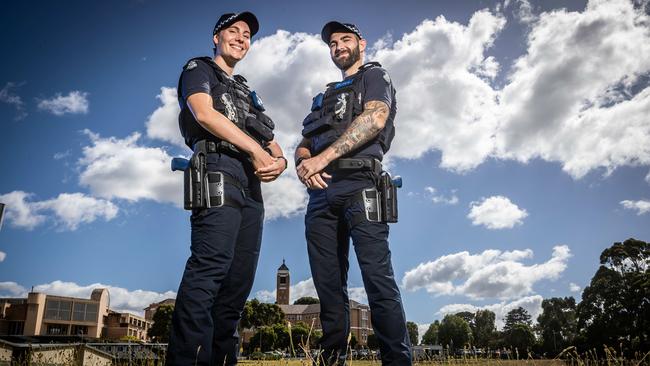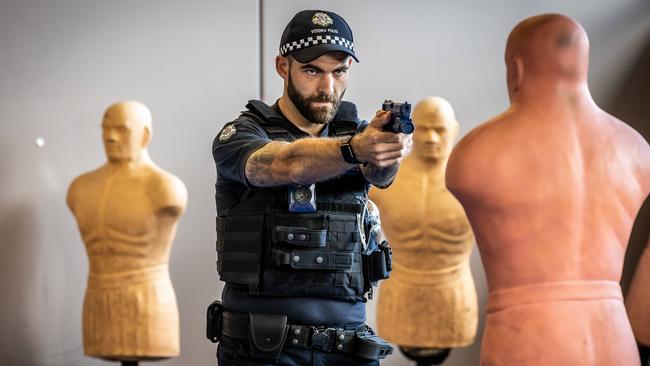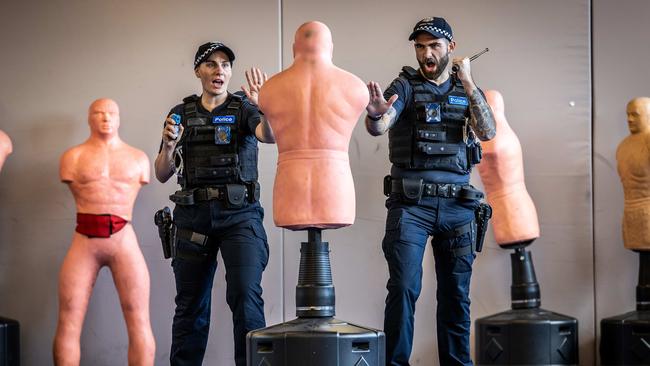Half of Victoria Police applicants not passing entrance exam; here’s how to prepare
Faced with the need for more than 2000 recruits in the next two years, Victoria Police has “adjusted” its thoughts on what it’s looking for in new officers.

Police & Courts
Don't miss out on the headlines from Police & Courts. Followed categories will be added to My News.
Victoria Police has streamlined key recruitment processes as the force undertakes the mammoth task of attracting at least 2000 officers over the next two years.
As part of a major recruitment drive, the organisation has moved its psychometric testing online to fast track the months-long process and will also move its entrance exam online in order to appeal to a broader pool of applicants.
Nearly 440 would-be police officers identified as ‘warm leads’ — those who had previously expressed interest in joining the force or who had prematurely withdrawn their application — have reapplied in the past two months.
It can also be revealed in January Victoria Police received its highest number of weekly applications in five years.
Last year the force was grappling with a worrying decline in applications due to low unemployment rates, a competitive jobs market and a laborious application process sometimes spanning 12 months.

Inspector Ashley Wigg, of the HR Command, said the organisation had significant work to do to meet targets and keep up with attrition.
“Over the next couple of years, we need several thousand recruits, we know it means we need tens of thousands of applications,” Insp Wigg said.
“We need to make the process shorter, not by cutting corners, but by compressing it.
“While we have applicants on the hook, we have to try and keep them because if we don’t, they start to look elsewhere. It is competitive.”
Candidates as young as 18 are wanted, with volunteer work, part-time jobs and school leadership roles helping applicants make the cut.
“We have adjusted our thinking to what we are looking for,” he said.
“We are happy to take an 18-year-old just out of school, or who has had a gap year, or has gone to do a trade. Those sorts of people hit the ground running.
“Squads can have a mix of people from age 18 right up to people in their 40s, it is a good blend of what is represented in the community.”
Insp Wigg said roughly half of applicants were not passing the entrance exam, which often came down to a lack of preparedness as it equates to a Year 10 standard.
It is made up of eight sections which assess verbal reasoning, numeracy skills, abstract reasoning, literacy skills, summary writing, extended writing, oral communication and digital literacy.
For other would-be cops, the fitness test which includes a beep test, a grip test, an agility run, push-ups and a prone bridge is where they fail.
The Police Fit app is a free training tool available to help applicants prepare.
Applicants who do not abide by corporate dress standards at their panel interview may throw away their chance at wearing the blue uniform.
“It’s a job interview, come dressed appropriately,” he said.
“We’ve had people turn up in Birkenstocks and beachwear. We want someone to have a level head on their shoulders who can hold a conversation and who can provide a decent response (to our questions).”
He said applicants’ driving and criminal history were thoroughly investigated.
“How does it look if you’re going out there enforcing the law, if you’re not able to abide by it,” he said.
“Recently we had a 42-year-old, who served imprisonment for an attempted murder, apply then challenged our decision to exclude them. It’s a no-brainer, it doesn’t work.”
Similarly, recreational drug-users need not apply.
“I’ve got no problem in saying no to people if they are committing offences that don’t align to the organisation’s values,” he said.
All applicants are randomly drug tested throughout their application process.
“It’s not a high number (who test positive), but it is alarming,” Insp Wigg said.
In one instance an applicant turned up to an interview impaired by drugs, in what was a shock for assessors.
Insp Wigg urged anyone considering a career change, to think of policing.
“There is so much variety, every day is different. It pays well, there is good leave, there is an ability to move around and up through the ranks. It is rewarding. It is not mundane.”
WHAT HAPPENS IF AND WHEN YOU GET IN
If selected, recruits are put through their paces during an intensive 31 week program at the Victoria Police Academy.
Would-be police officers undergo reality-based training, simulations, practical scenarios and classroom lectures at the Glen Waverley grounds.
Constable Nina Montague, 23, knew she wanted to join the force at high school but undertook an international studies degree at university before applying.
“I’ve always wanted a job helping people, as I want to have an impact on people’s lives,” Con Montague said.
“Every day is so different, it is the first job where I don’t get the ‘Sunday Scaries’ — when the pit of your stomach drops before the working week.
“The Academy is all encompassing, I’ve loved it.”

She hopes to one day become a detective or work in counter-terrorism.
For Constable James Morrow, 28, policing is a family affair.
“My great-grandfather was a senior sergeant back in the day,” he said.
“My grandfather did transit investigation work. It’s great to make my family proud.”
Con Morrow worked as a crane operator, truck driver and labourer before joining the force.
“It was a bit bland,” he said of the construction industry.
“There are a lot of opportunities in different areas at Victoria Police. You are doing different things every day. One minute you are in the classroom and the next you are out doing drills.”
His advice to anyone thinking of applying: “It is a slog but stick with it, you’ll get there and it pays off. Victoria Police is looking for anyone and everyone, that’s what makes the organisation great. They are willing to take anyone in and help make you the best you can be.”
A careers expo will be held on March 18 at the Melbourne Convention Centre.




